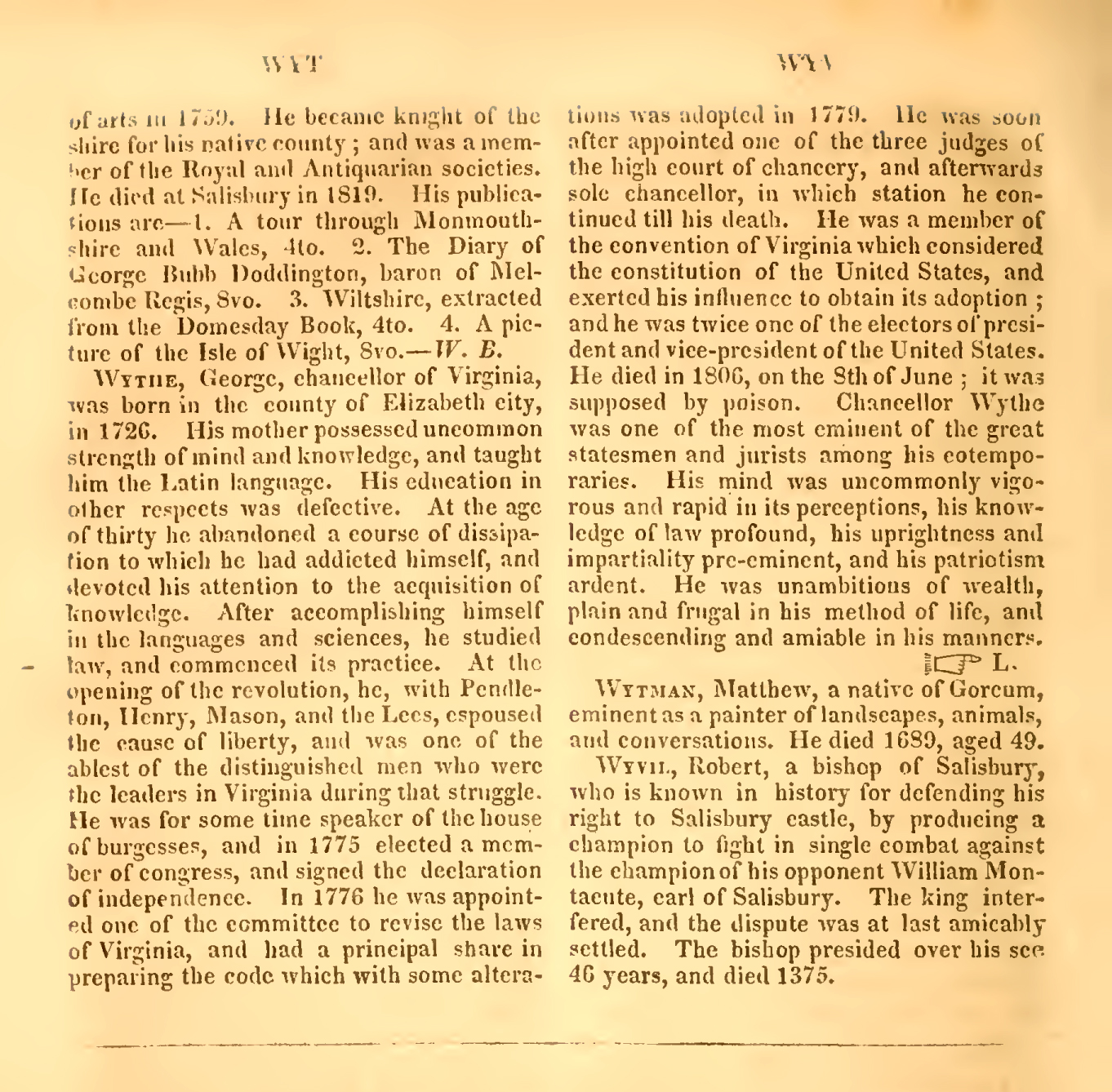Lempriere's Universal Biography
George Wythe did not have an article in the first (1808-1810) edition John Lemprière's Universal Biography ("Containing a Critical and Historical Account of the Lives, Characters, and Labours Eminent Persons, in All Ages and Countries"). The second edition of 1825, edited by Eleazar Lord, however, was an attempt to provide "an American Biographical Dictionary, in connexion with the standard volumes of Lempriere," and included original articles selected from Watkin's Biographical Dictionary (London: R. Phillips, 1800) as well as new articles by Lemprière (signed with an "L").
Wythe's entry is brief, but thorough in listing his various political appointments and offices.[1] The article unfortunately perpetuates the story that Wythe spent some ten years' time in a "course of dissipation," and misstates his entry to the bar at age 30, instead of 20.[2] These errors are perpetuated in Call's biograpical sketch of 1833, and Minor's "Memoir of the Author," in Wythe's Reports (1852).
Article text, 1825
Page 834

WYT
WYV
WYTHE, George, chancellor of Virginia, was born in the county of Elizabeth city, in 1726. His mother possessed uncommon strength of mind and knowledge, and taught him the Latin language. His education in other respects was defective. At the age of thirty he abandoned a course of dissipation to which he had addicted himself, and devoted his attention to the acquisition or knowledge. After accomplishing himself in the languages and sciences, he studied law, and commenced its practice. At the opening of the revolution, he, with Pendleton, Henry, Mason, and the Lees, espoused the cause of liberty, and was one of the ablest of the distinguished men who were the leaders in Virginia during that struggle. He was for some time speaker of the house of burgesses, and in 1775 elected a member of congress, and signed the declaration of independence. In 1776 he was appointed one of the committee to revise the laws of Virginia, and had a principal share in preparing the code which with some alterations was adopted in 1779. He was after appointed one of the three judges of the high court of chancery, and afterwards sole chancellor, in which station he continued till his death. He was a member of the convention of Virginia which considered the constitution of the United States, and exerted his influence to obtain its adoption; and be was twice one of the electors of president and vice-president of the United States. He died in 1806, on the 8th of June; it was supposed by poison. Chancellor Wythe was one of the most eminent of the great statesmen and jurists among contemporaries. His mind was uncommonly vigorous and rapid in its perceptions, his knowledge of law profound, his uprightness and impartiality pre-eminent, and his patriotism ardent. He was unambitious of wealth, plain and frugal in his method of life, and condescending and amiable in his manners.
- ☞ L.
See also
- American Biographical and Historical Dictionary
- Biographie Universelle
- Discourse Refuting Statements Made That George Wythe at One Time Led a Life of Dissipation
- Encyclopaedia Americana
- Encyclopedia Americana
- Encyclopedia of Virginia Biography
- National Cyclopaedia of American Biography
References
- ↑ John Lemprière, "Wythe, George," in Lempriere's Universal Biography, ed. Eleazar Lord (New York: R. Lockwood, 1825), 2:834.
- ↑ Leon M. Bazile, "Discourse Refuting Statements Made That George Wythe at One Time Led a Life of Dissipation," n.d., Virginia Historical Society, Richmond, Virginia.
External links
Read this article in Google Books.